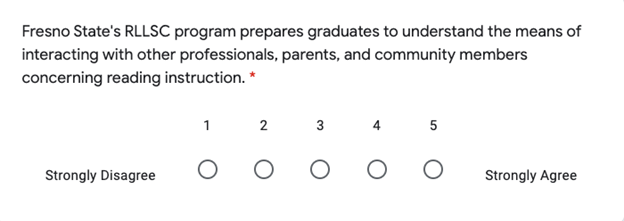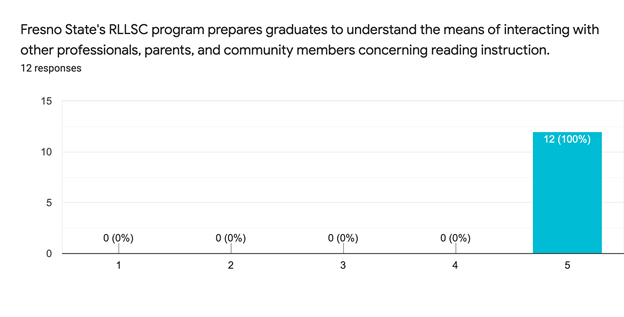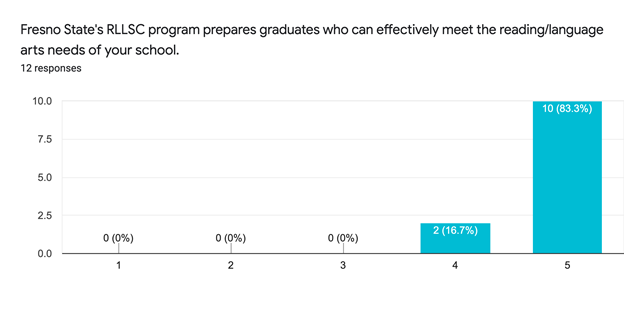AAQEP Accreditation
Standard 1 Aspect F
Standard 1f: Evidence shows that, by the time of program completion, candidates exhibit knowledge, skills, and abilities of professional educators appropriate to their target credential or degree, including: Dispositions and behaviors required for successful professional practice
Data Sources & Analysis:
Data Source 1
LEE 213 Theory to Practice Inquiry
Perspective Captured from Data Source: Instructor
Rationale for using Data Source:
LEE 213, Teaching the Language Arts K-12, is a course our candidates take during their
first semester in the Reading/Literacy program. The course focuses on developing candidates’
knowledge about integrating the language arts, reading-writing connections, and using
language arts in literature-based reading programs.
A key assignment in the course--and of the program as a whole--is a Theory to Practice Inquiry the candidates conduct. Students select a topic of inquiry driven by their professional experiences teaching language arts.
The overall assignment is scored using a rubric. For the purposes of determining whether or not our candidates have the necessary knowledge regarding dispositions and behaviors required for successful professional practice we chose to focus on the rubric dimension “Reflection and Next Steps.” This component assesses candidates’ ability to critically reflect about their inquiry and include the implications the inquiry has on their educational context.
Specific Elements of Data Source:
LEE 213 Theory to Practice Inquiry Rubric Item: Reflection & Next Steps
| - | Proficient (4) | Developing (3) | Beginning (2) |
|---|---|---|---|
| Reflection & Next Steps (4 points) |
• Includes thoughtful reflection about inquiry • Includes insightful implications for the inquiry based on findings with clear connections to research literature • Uses specific, appropriate evidence to support claims |
• Includes general reflection about findings • Includes general implications for the inquiry based on findings; attempts connections to research literature • Uses some appropriate evidence to support claims |
• Includes little/no reflection about findings • Missing implications for the inquiry based on findings; no connections to research literature • Uses little/no evidence to support claims |
Definition of Success for Each Element:
As a program, our goal is for candidates to score at least at the Developing level,
which equates to a score of 3. This demonstrates that candidates exhibit an ability
to at least include a general reflection about their inquiry and make surface-level
implications their inquiry has on their educational context. Our goal is for at least
75% of candidates to meet this learning outcome.
Displays of Analyzed Data:
| - | Reflection & Next Steps (out of 4) | % of students reaching goal of (score of 3 or higher) |
|---|---|---|
| 2018 (24 students) | 4 | 93% |
| 2019 (17 students) | 3.94 | 100% |
| 2020 (15 students) | 3.8 | 100% |
Link to Full Dataset:
Interpretation of Data:
Findings from 2018- 2020 demonstrate that, overall, program candidates scored well
above the programmatic target of a 3 on this rubric component. This suggests that
candidates leave the program with a clear understanding of and ability to critically
reflect and discuss the implications of educational inquiry on their education context
- which are dispositions required for successful professional practice.
Data Source 2:
Reading, Language, Literacy Specialist Credential Completer Survey
Perspective Captured from Data Source: Candidate
Rationale for using Data Source:
Beginning in Fall 2020, the RLLSC Program began administering a survey to candidates
upon their completion of the program as a way to learn more about their perceptions
of how well the program prepared them.
Using the RLLSC Completer Survey allows us to capture candidates’ perspectives on professionalism upon completion of the program
Specific Elements of Data Source:

Definition of Success for Each Element:
Programmatically, our goal is for candidates to rate the program at a 4 or a 5 within
each area.
Displays of Analyzed Data


Link to Full Dataset:
RLLSC Program Completion Survey Data (Names Redacted)
Interpretation of Data:
Because the program only began administering the completion survey in Fall 2020, we
only have one cycle of data to analyze. Of the 12 completers surveyed, all provided
responses for a response rate of 100%.
Overwhelmingly, the completers who responded indicated they strongly agreed that that the program prepared them with the dispositional comportments necessary to interact with other professionals, parents, and community members concerning reading instruction and the completers who responded indicated they strongly agreed that the program prepared them with the knowledge and skills to meet the reading/language arts needs of their school sites.
Next Steps:
Evidence shows that, by the time of program completion, candidates exhibit dispositions
and behaviors required for successful professional practice, including the ability
to conduct inquiry, critically reflect, and understand the implications of their inquiry
in the education context as measured by a course instructor. Additionally, completers
indicate their abilities to interact with others in their local education context
and meet the professional literacy needs at their school sites.
We will continue to support students as they develop their professional dispositions by revisiting one of the final assignments in the program, the LEE 254 coaching assignment and adding an area to the rubric to assess whether candidates exhibit dispositions and behaviors required for successful professional practice in their coaching videos. By revising this assignment, we can include a measure related to dispositions of successful professional practice. It is our goal to revise and implement a pilot of this revision in the 2021-22 year.